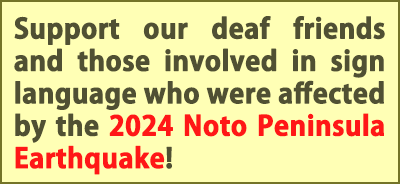from July 2003 Issue of Japanese Deaf News, JFD’s monthly newspaper:
Protestors Demand Immediate Discontinuation of the Screening Test
The “Symposium on Hearing Screening for Newborn Infants” was held on May 18 at the Tokyo Olympic Youth Center, attended by about 200 people, including teachers of Deaf schools, otolaryngologists, social workers, parents of children with hearing impairments, and members of organizations of the Deaf.
The morning session consisted of presentations by 3 speakers. Mr. Jun Mishina of Tokyo Women’s Medical University, Maternity and Childcare Center showed a video introducing the screening test, and explained that the test enabled early detection. Ms. Keiko Kawasaki of Bukkyo University, Clinical Psychology Research Center explained that a stable relationship between the mother and infant has positive influences on character formation. Ms. Yoko Matubara of Ritsumeikan University Graduate Division, Department of Comprehensive Advanced Academic Research stressed that “those involved would have to present both the risks and benefits of such screening, and work together with the administrative, medical, and other professionals to reevaluate the structure of newborn infant screening.”
Heated discussions were held in the afternoon session. Mr. Yutaka Osugi, Director of the Head Office of the Japanese Federation of the Deaf, spoke on behalf of the Deaf. He said that the screening has been developed from the standpoint of medical and other professionals and only causes anxiety. He demanded the immediate discontinuation of the system.
Ms. Ayako Hashikura of the Association of Parents of Deaf Children said, “In Japan today, the test is given by obstetrical professionals without any follow-up support. In Colorado, USA, for example, physicians specializing in gynecology, obstetrics, pediatrics, and otolaryngology work together as a professional team to provide once-a-week counseling and early intervention programs.”
The session rounded up with Ms. Misato Tanaka speaking from the standpoint of an otolaryngologist. She presented the issues which still remain to be discussed and solved, while at the same time explaining the importance of early identification and early intervention.


